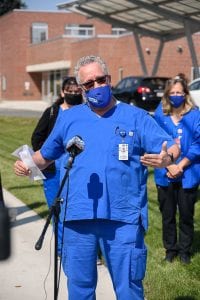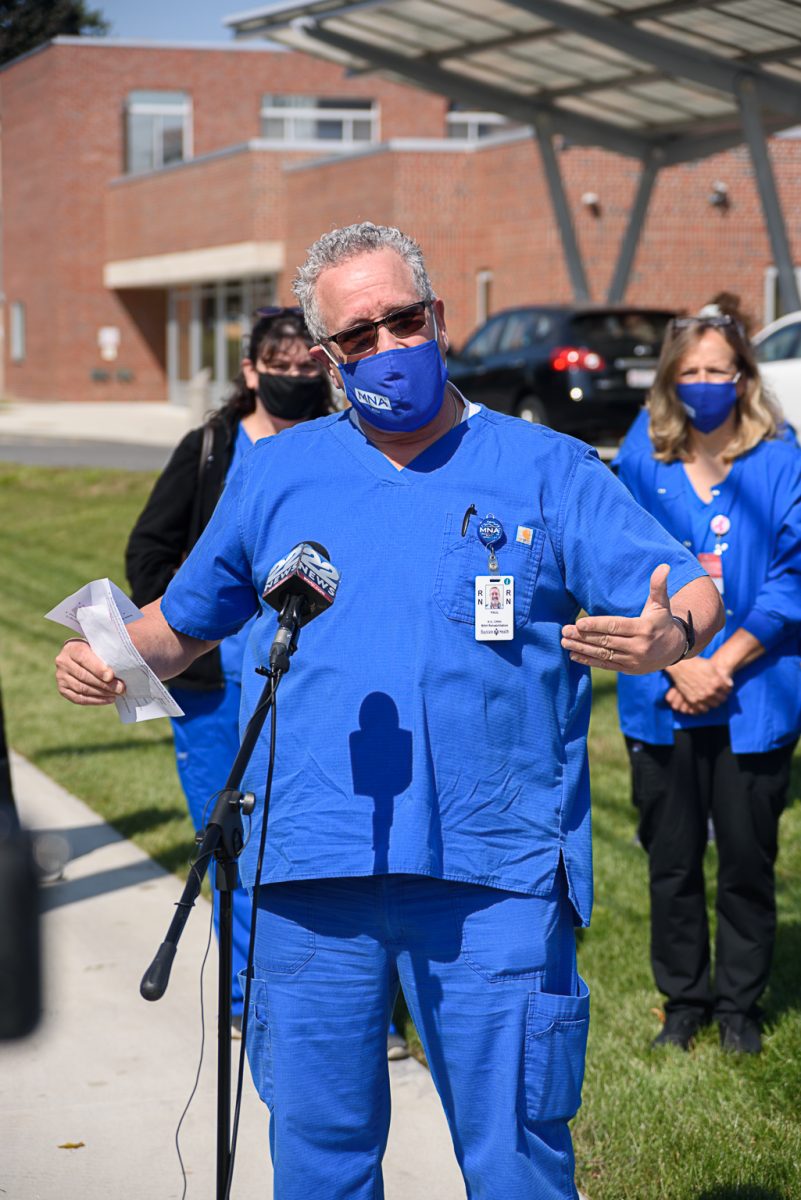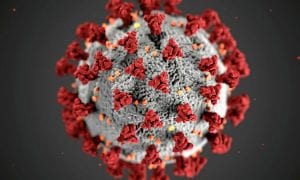
Noble Hospital registered nurse Paul Dubin speaks to reporters outside Noble Hospital Sept. 23, 2020. (MARC ST. ONGE/THE WESTFIELD NEWS)
WESTFIELD – Baystate Noble Hospital nurses revealed results of a survey of 464 local community members Wednesday and called for action from Baystate Health System.
The Massachusetts Nurses Association and Baystate Noble nurses Sept. 23 hosted a press conference outside the Westfield hospital and said the survey results show the community is overwhelmingly against past and future cuts at Noble.
The survey showed that upwards of 90% of respondents were in favor of keeping the Fowler Behavioral Health unit open as well as reopening the intensive care unit that was closed last year.
A medical-surgical unit and telemetry units were merged last year, resulting in Baystate Noble staff cuts.
“Baystate has made several cuts in the last few years that has diminished our ability for quality care and patient services,” said Paul H. Dubin, a registered nurse at Baystate Noble.
Baystate Health has plans to open a 120-bed behavioral health hospital with its partner, Kindred Behavioral Health. The new hospital, which would open two years from the start of construction, would serve the region. Behavioral health units at Noble, Baystate Franklin and Wing Memorial hospitals would close.
During a March 2020 press conference, Dubin noted that Baystate Noble is the community hospital for the Hilltowns as well as Westfield and Southwick. He said at the time that moving essential services, such as intensive care and behavioral health, would be detrimental to the larger community.
Dubin said Wednesday a virtual public forum to discuss the future of Baystate, hosted by state Sen. John C. Velis, is slated for Oct. 6 at 6 p.m. To participate in the meeting and to receive an email invite, visit www.massnurses.org/NobleForum.
Keeping the Fowler Unit open and expanding its capacity was supported by 93% of survey respondents. Another 93% said that they would be in favor of expanding the capacity of 2N, the medical-surgical unit affected by the 2019 unit merger, and 97% said that the hospital should be required to keep a hospital unit open if it is determined to be an essential service by the Department of Public Health.
Mary Martin, RN, has worked in the emergency room for 32 years. She said that the cuts made by Baystate Health System resulted in situations where there was a backlog of patients waiting to either be admitted or transferred to Baystate Medical Center in Springfield, which was problematic at the height of the COVID-19 pandemic last spring.
The Massachusets Nurses sent an open letter to Baystate Noble President Ron Bryant requesting his presence at the Oct. 6 forum. In the letter, they said that the union was still awaiting a response from Bryant to a petition delivered to him in March. Signed by 95% of Noble nurses, the petition asked him to hold a public meeting about the changes being made to the hospital.
Bryant released a statement Wednesday, calling the timing of the forum “disappointing.”
The full statement from Bryant is as follows:
“During these challenging times, I am extremely proud of the entire team at Baystate Noble Hospital. Throughout the Covid-19 pandemic, it has been critical to carefully optimize our regional resources – ranging from expert trauma and ICU level care at our Baystate Medical Center to the local services in our community hospitals, like Baystate Noble, offer. The pandemic reinforced the value of our careful assessment of community health needs and data around usage patterns in the local setting. Baystate Health continues to be successful in providing the right care at the right time in the right place.
We value input and support from our community and continuously engage with our diverse groups of volunteer community representatives who serve on our boards, committees, and advisory councils at our hospitals and other entities.
The timing of the MNA’s forum is disappointing. Baystate Health has been doing everything possible to foster a sense of community and shared purpose across our system and throughout our community. Divisive measures that do not take into account the complex factors involved in operating a community hospital and regional health system are counterproductive.
Our entire team of dedicated professionals will continue to focus their efforts on providing preventive healthcare services, addressing emergency needs and managing the ongoing threat of COVID-19.”






